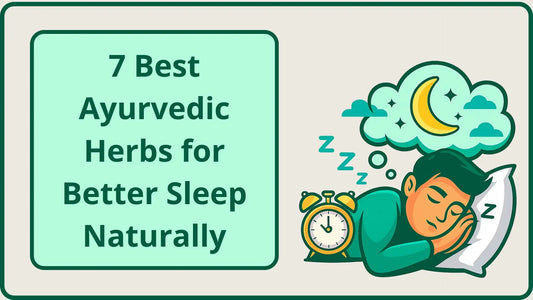
7 Best Ayurvedic Herbs for Better Sleep Naturally
Tossing and turning every night, struggling to get even a few hours of good sleep. If this is what describes the story of your current life, then you have reached the right place for a solution.
Going to bed on time, but not falling asleep, can be an issue. There can be various reasons why you are feeling this way.
Stress, anxiety, overthinking, physical challenges or sleeping disorders are some of the reasons that are obstructing your sleep.
Whatever the reason may be, in this blog, you will find a natural, easy-to-adapt solution, the ayurvedic herbs that can help you get the sleep you have been waiting for.
Ayurvedic Herbs to Get Better Sleep
1. Valerian root (Ayurvedic Name: Tagara)

This Ayurvedic herb has been used in Greece and Rome since ancient times to treat insomnia and nervousness. It contains valerenic acid and valepotriates, which interact with
neurotransmitters in the brain, promoting relaxation. It also provides support for better sleep by reducing the time taken to fall asleep and improving overall sleep quality.
How to take it?
Dosage can vary, but studies suggest that doses between 300–600 mg of valerian extract, taken 30 minutes to two hours before bedtime, are effective in promoting sleep.
Precautions to take
Valerian root can sometimes lead to dizziness, headaches, and gastrointestinal disturbances in some individuals; therefore, it should be used with caution.
2. Chamomile

You might consider it just a herb, but it has been a popular folk remedy for promoting relaxation and sleep for centuries. It contains apigenin, an antioxidant that binds to specific receptors in the brain, exerting a mild natural sedative effect. Its use has been especially beneficial for people struggling to sleep due to chronic insomnia and anxiety.
How to take it?
Drinking one cup of chamomile tea 30 minutes before bedtime can help promote
relaxation and improve sleep quality.
Precautions to take
Chamomile may cause allergic reactions; individuals with sensitivities to plants in the Asteraceae family should use it with caution.
3. Lavender

This herb is well known for its pleasant aroma and relaxing properties. In Ayurveda, it is used in aromatherapy for promoting better sleep and reducing anxiety; its aromatic scent enhances sleep and reduces restlessness.
How to take it?
Use it as essential oils in aromatherapy, either by adding a few drops to a diffuser or incorporating them into a bedtime routine.
Precautions to take
Lavender, when used in high doses, can lead to nausea or skin irritation.
4. Passion Flowers

Passionflower has flavonoids, which interact with neurotransmitters in the brain, to put the brain in a deep, relaxed and restful mode. It also blocks mild sleep disturbances that create complications in getting restful sleep.
How to take it?
You can take 500 mg of passionflower extract an hour before bedtime.
Precautions to take
Pregnant, breastfeeding women and those with liver issues and taking sedatives should avoid its use.
5. Ashwagandha

In Ayurveda, it is famous for being a stress reliever. It reduces stress by controlling the stress hormone, cortisol, which helps promote relaxation and improve sleep. Studies done to measure its effectiveness show that Ashwagandha can enhance sleep quality and decrease sleep latency in people with insomnia.
How to take it?
As per studies, the recommended dose for improving sleep quality ranges from 300–600 mg of ashwagandha extract per day.
Precautions to take
Pregnant, breastfeeding women or those with stomach ulcers, liver issues, or autoimmune diseases should avoid its use.
6. Lemon Balm

Lemon Balm acts as a natural sedative and calming agent. When combined with other herbs like valerian roots, it enhances sleep quality. It contains compounds such as rosmarinic acid that increase neurotransmitters in the brain, bringing the body to a state of rest, free from anxiety.
How to take it?
Studies say that it’s safe and effective to take 300–600 mg of lemon balm extract daily. You can also drink its tea before bed to support your sleep.
Precautions to take
People with diabetes who have a surgery scheduled or are on anaesthesia, sedatives or certain medications should avoid its use.
7. Hops

This herb supports sleep by promoting restlessness, reducing anxiety, and managing sleep disorders. They contain bitter acids and essential oils that are believed to interact with GABA receptors in the brain, providing a natural sedative effect. It works best in combination with veteran roots.
How to take it?
-
For hops extracts,150–300 mg, or around 500 mg of dried hops, can be taken 30 minutes before bed.
-
When using hops in tea or tincture, follow the same 20–30 minute pre-bedtime timing to allow sedative effects to take hold.
Precautions to take
Pregnant/breastfeeding women or those with hormone-sensitive conditions or depression should use with caution or avoid.
Conclusion
Herbs are just one aspect of Ayurvedic ways to get better sleep naturally. Remember, these are not substitutes for medical treatment. You can make these herbs a part of your daily routine. Be consistent with its use to get desired results.
Also, align it with the right lifestyle habits and avoid staying up late at night. For more such Ayurvedic solutions to your health issues, consider reading our blog.
References
- Tiwari R. (2020). Insomnia: A study on sleeping disorder with reference of Ayurvedic herbs. ResearchGate. Published 2020 Nov 30. Retrieved from: https://www.researchgate.net/publication/346475716_Insomnia_A_Study_on_Sleeping_Disorder_with_the_Reference_of_Ayurvedic_Herbs
- Abdulkader M, Prakash D, Manikandan S. (2019). Herbs for better sleep: A natural guide to improving sleep quality and overcoming insomnia with herbal remedies. Australian Herbal Insight, 2(1), 1–5. Published 2019 Oct 21. Retrieved from: https://publishing.emanresearch.org/CurrentIssuePDF/EmanPublisher_3_5654ahi-21207811.pdf
- Yeom JW, Cho CH. (2024). Herbal and natural supplements for improving sleep: A literature review. Psychiatry Investig, 21(8), 810–821. Retrieved from: https://pdfs.semanticscholar.org/18bb/d68d8c3da14e0c16be994f59d50fc29f9f32.pdf
- Guadagna S, Barattini DF, Rosu S, Ferini-Strambi L. (2020). Plant extracts for sleep disturbances: A systematic review. Evid Based Complement Alternat Med, 2020, 3792390. Published 2020 Apr 21. Retrieved from: https://pmc.ncbi.nlm.nih.gov/articles/PMC7191368/

SAT KARTAR
Sat Kartar Limited is a trusted name in the field of Ayurveda, dedicated towards bringing you a holistic solution for your overall wellness. We have been serving people with real, natural solutions for more than 12 years. Through our educational blogs, health resources, and product innovations, we aim to empower people to embrace Ayurveda as a way of life and restore their inner balance, strength, and vitality.


